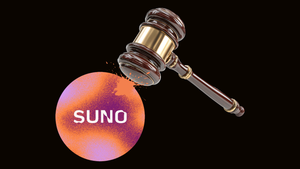Anthony Justice - the musician who sued Suno for copyright infringement back in June, insisting that indie artists like him have been “trampled the most” by unlicensed AI - has updated his lawsuit.
Following the lead of the major labels - who updated their own Suno litigation last week - he’s added new allegations that the AI start-up sourced its training data by illegally stream-ripping audio from YouTube.
That’s relevant in the context of the recent ruling in another AI copyright case involving a group of authors and Anthropic, in which the judge said that AI companies that source training data from illegal sources can’t rely on the fair use defence when accused of copyright infringement.
In order to access existing music to train its AI model, Justice’s updated lawsuit claims, Suno “engaged in ‘stream ripping’, a form of piracy that circumvents encryption, authentication and other digital rights management technologies, thereby bypassing technological protection measures designed to prevent unauthorised copying”. Such circumvention arguably violates US copyright law.
There were two landmark judgements earlier this year that both considered the argument put forward by many tech companies that training AI is fair use under US copyright law, meaning they don’t need permission to use existing content when training their models.
Both involved lawsuits filed by a group of authors, with Meta sued as well as Anthropic. The judges in both cases accepted that AI training can be fair use, but with important caveats that are useful for creators and copyright owners.
First, the crucial point that - if training data is gathered from piracy sources - fair use doesn’t apply, a ruling that persuaded Anthropic to agree to a $1.5 billion settlement with the authors. Both the RIAA and Justice obviously hope that principle also trashes Suno’s fair use defence.
Justice’s amended lawsuit also references the judgement made in the Meta case. The judge in that dispute, Vincent Chhabri, accepted Meta’s fair use defence, but said that there were arguments that creators and rightsholders could employ to defeat a fair use claim, it’s just the authors that sued Meta hadn’t presented those arguments in their litigation.
In his new filing, Justice notes how Chhabri states that fair use “typically doesn’t apply to copying that will significantly diminish the ability of copyright holders to make money from their works”.
Tech companies argue that that principle should only apply if the use of a copyright protected work results in a new piece of content that directly and specifically competes with the existing work. Which, in the context of generative AI, will hardly ever happen.
But Chhabri suggested this principle could apply more widely than that, including if an AI “can generate works that are similar enough” to “compete with the originals and thereby indirectly substitute for them”.
So, if the Suno AI outputs loads of new music that is then pushed onto the streaming services, where it competes for listens with human-made music, and pulls money from each platform’s royalty pool away from human creators, maybe that’s “significantly diminishing the ability of copyright holders to make money from their works”. Which would mean Suno’s use of existing music was not fair use.
And while it’s true that most AI-generated music uploaded to streaming platforms probably won’t get many streams, given the huge quantity of music that could potentially come out the Suno AI model and find its way onto the platforms, if only a tiny fraction gets decent streams, that’s still a lot of streams.
“Music streaming platform Deezer reports that nearly a third of all tracks uploaded to Deezer are now fully AI-generated - almost 33%”, Justice’s updated lawsuit notes. And “Suno’s website has the potential to generate directly competing AI music at such speed that it risks overrunning the market for human-made sound recordings”.
Relying on Chhabri’s conclusion in the Meta case, Justice then states, “if Suno’s use causes harm to independent artists by negatively impacting the existing music market for artists’ music, such a finding weighs against fair use”.
We await to see how Suno - which was scathing about Justice’s original lawsuit - responds to the new arguments against its fair use defence. We know the AI company has already had talks with the majors about a possible settlement. Could it now look to do a class settlement for indie musicians via the Justice litigation similar to that being proposed in the authors v Anthropic case? We shall see.

